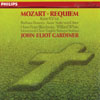Mozart Requiem, K626; Kyrie, K341
View record and artist detailsRecord and Artist Details
Composer or Director: Wolfgang Amadeus Mozart
Genre:
Vocal
Label: Digital Classics
Magazine Review Date: 11/1987
Media Format: CD or Download
Media Runtime: 55
Mastering:
Stereo
DDD
Catalogue Number: 420 197-2PH

Tracks:
| Composition | Artist Credit |
|---|---|
| Requiem |
Wolfgang Amadeus Mozart, Composer
Anne Sofie von Otter, Mezzo soprano Barbara Bonney, Soprano English Baroque Soloists Hans-Peter Blochwitz, Tenor John Eliot Gardiner, Conductor Monteverdi Choir Willard White, Bass Wolfgang Amadeus Mozart, Composer |
| Kyrie |
Wolfgang Amadeus Mozart, Composer
English Baroque Soloists John Eliot Gardiner, Conductor Monteverdi Choir Wolfgang Amadeus Mozart, Composer |
Composer or Director: Wolfgang Amadeus Mozart
Label: Digital Classics
Magazine Review Date: 11/1987
Media Format: Cassette
Media Runtime: 0
Mastering:
Stereo
DDD
Catalogue Number: 420 197-4PH

Tracks:
| Composition | Artist Credit |
|---|---|
| Requiem |
Wolfgang Amadeus Mozart, Composer
Anne Sofie von Otter, Mezzo soprano Barbara Bonney, Soprano English Baroque Soloists Hans-Peter Blochwitz, Tenor John Eliot Gardiner, Conductor Monteverdi Choir Willard White, Bass Wolfgang Amadeus Mozart, Composer |
| Kyrie |
Wolfgang Amadeus Mozart, Composer
English Baroque Soloists John Eliot Gardiner, Conductor Monteverdi Choir Wolfgang Amadeus Mozart, Composer |
Composer or Director: Wolfgang Amadeus Mozart
Label: Digital Classics
Magazine Review Date: 11/1987
Media Format: Vinyl
Media Runtime: 0
Mastering:
Stereo
DDD
Catalogue Number: 420 197-1PH

Tracks:
| Composition | Artist Credit |
|---|---|
| Requiem |
Wolfgang Amadeus Mozart, Composer
Anne Sofie von Otter, Mezzo soprano Barbara Bonney, Soprano English Baroque Soloists Hans-Peter Blochwitz, Tenor John Eliot Gardiner, Conductor Monteverdi Choir Willard White, Bass Wolfgang Amadeus Mozart, Composer |
| Kyrie |
Wolfgang Amadeus Mozart, Composer
English Baroque Soloists John Eliot Gardiner, Conductor Monteverdi Choir Wolfgang Amadeus Mozart, Composer |
Author: Stanley Sadie
The performance, though on period instruments, is fairly traditional in style too. Tempos are mostly on the quickish side of average; an exception is the Agnus Dei, to which Gardiner gives a good deal of expressive weight, appropriate at that stage of the work. The big choruses of the Sequenz have plenty of cut and thrust (with the supporting trombones unusually well audible), and the fugal ones are sharply etched (''Quam olim Abrahae'' has great athleticism). Lines are taut, textures are clear—and the close recording, together with the well-defined articulation, allows the inner detail to be well audible. I like the quick tempo for the Sanctus, avoiding the ponderous in this relatively weak piece; the brisk ''Osanna'' fugues, however, cannot help seeming a trifle perfunctory. The Benedictus is beautifully phrased; I am more than ever reluctant to believe there is nothing of Mozart here. Some movements are a little self-consciously articulated, notably the ''Domine Jesu''; and Gardiner does not hesitate to flex the tempo quite generously to make expressive points (in the ''Hostias'', for example). There is some first-rate solo singing, from the two middle voices above all, though the soprano is also graceful and sweet of tone; possibly the bass does not blend perfectly in style or tone with the upper voices. The trombone obbligato is forthright and secure.
Comparison with existing versions is difficult as the others using period instruments also use different texts. On the whole I find this one preferable to the Kuijken (Accent), which is much slower and less natural-sounding. There is, however, much to be said for the Hogwood (L'Oiseau-Lyre), which, using the Maunder text, leaves out several movements that most of us like to hear; in some respects it is musically more persuasive than the new Gardiner. But Gardiner has the advantage of offering too the noble D minor Kyrie, a deeply felt and richly orchestrated work (which may well be much later than its Kochel number suggests). No simple recommendation is possible, or would be fair, but the extra music on this new release clearly gives it some advantage.'
Discover the world's largest classical music catalogue with Presto Music.

Gramophone Digital Club
- Digital Edition
- Digital Archive
- Reviews Database
- Full website access
From £8.75 / month
Subscribe
Gramophone Full Club
- Print Edition
- Digital Edition
- Digital Archive
- Reviews Database
- Full website access
From £11.00 / month
Subscribe
If you are a library, university or other organisation that would be interested in an institutional subscription to Gramophone please click here for further information.





